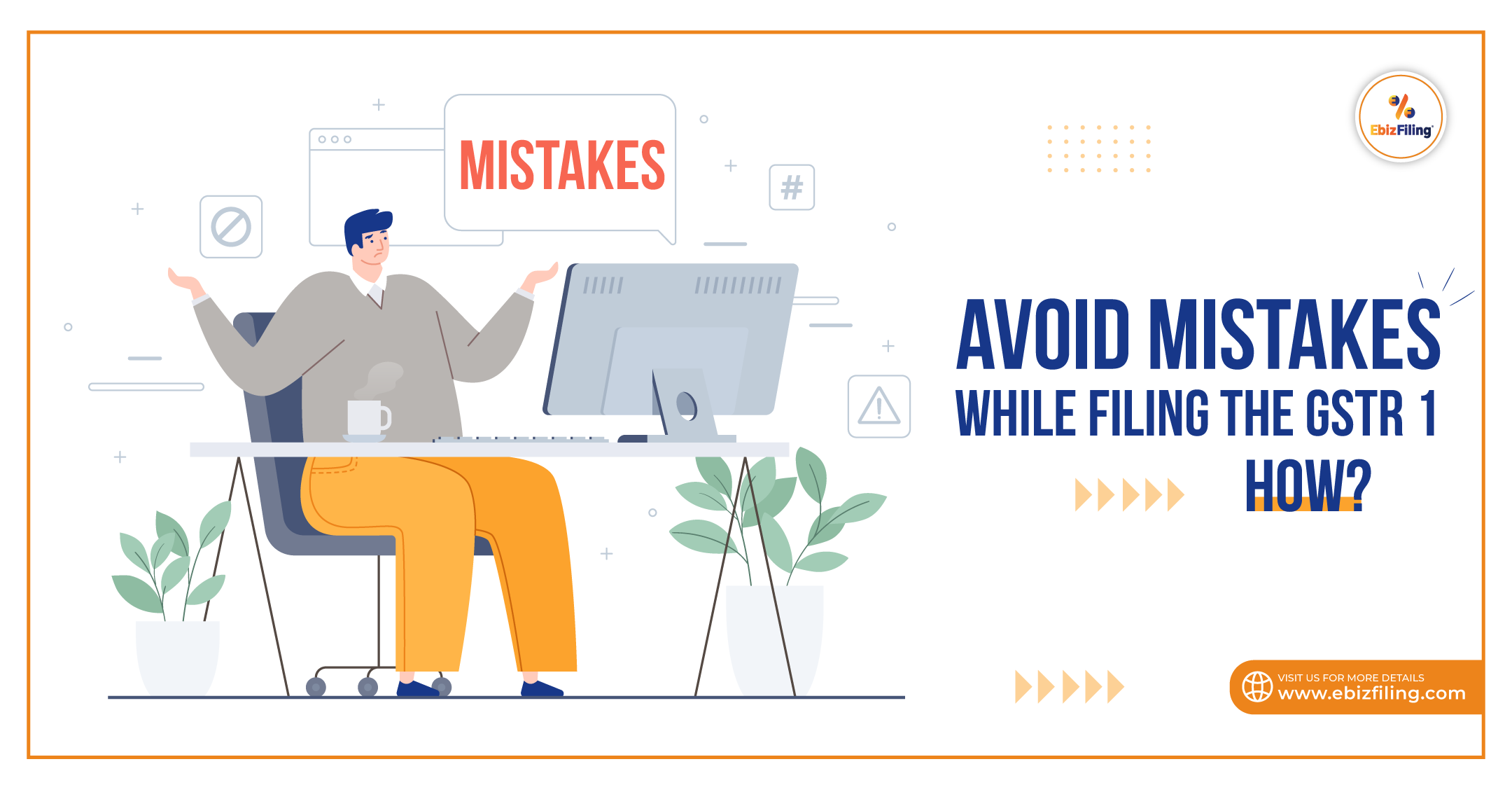
-
April 7, 2023
Mistakes to avoid while filing GSTR 1
Table of Content
Introduction
The Goods and Services Tax (GST) is a comprehensive indirect tax levied on the supply of goods and services in India. Every registered person under GST is required to file various returns, including GSTR 1, which is a monthly or quarterly return that contains details of all outward supplies made during the period. However, filing GSTR 1 can be a challenging task for businesses, and any errors in the return can lead to penalties and legal issues. In this blog, we will discuss the mistakes to avoid while filing GSTR 1.
What are the mistakes to be avoided while filing GSTR 1?
There are different mistakes to be avoided while filing GSTR 1. Some of them are listed below-:
Mistake 1: Incomplete or inaccurate information
One of the most common mistakes made while filing GSTR 1 is providing incomplete or inaccurate information. This can lead to discrepancies in the return and result in rejection or scrutiny by the authorities. To avoid this, businesses should ensure that all details of the outward supplies, including the name, address, and GSTIN of the recipient, the HSN code of goods or services, the quantity, value, and tax rate, are entered correctly in the return.
Mistake 2: Late filing of GSTR 1
Another mistake that businesses often make is filing GSTR 1 after the due date. Late filing of GSTR 1 can lead to penalties, interest, and even cancellation of the registration. To avoid this, businesses should ensure that they file the return before the due date, which is the 11th of the following month for monthly filers and the 13th of the following month for quarterly filers.
Mistake 3: Non-reconciliation of data
Businesses should ensure that the details provided in the GSTR 1 match with the books of accounts. Any discrepancies in the data can lead to issues during audits and inspections. To avoid this, businesses should reconcile the data in the GSTR 1 with their books of accounts regularly.
Mistake 4: Failure to report credit notes and debit notes
Another mistake that businesses often make is failing to report credit notes and debit notes in the GSTR 1. Credit notes are issued when there is a reduction in the value of the outward supplies, while debit notes are issued when there is an increase in the value of the outward supplies. Failure to report credit notes and debit notes can lead to discrepancies in the return and result in penalties and legal issues. To avoid this, businesses should ensure that all credit notes and debit notes are reported correctly in the GSTR 1.
Mistake 5: Not reporting nil returns
Businesses that have not made any outward supplies during the period should still file a nil return. Failure to do so can lead to penalties and legal issues. To avoid this, businesses should ensure that they file a nil return if they have not made any outward supplies during the period.
Mistake 6: Not reporting exports and deemed exports
Exports and deemed exports are zero-rated supplies and these are eligible for a refund of the taxes paid on the inputs used in the production of the goods or services. Failure to report exports and deemed exports in the GSTR 1 can result in the loss of the refund. To avoid this, businesses should ensure that they report exports and deem exports correctly in the return.
Mistake 7: Not reporting advances received
Advances received for the supply of goods or services should be reported in the GSTR 1. Failure to report advances received can lead to discrepancies in the return and result in penalties and legal issues. To avoid this, businesses should ensure that they report advances received correctly in the return.
Mistake 8: Not filing amendments
Businesses may need to make amendments to the GSTR 1 due to various reasons such as incorrect information, changes in the details of the recipient, or cancellation of the supply. Failing to file can lead to various consequences for businesses. To avoid this it is essential for businesses to file amendments in GSTR 1 on time and ensure that all their sales data is accurately reported to avoid any penalties or compliance issues.
Writer’s Choice – GST returns will reflect in your Income Tax Passbook (Form 26AS)
Conclusion
Filing GST Returns can be a complex process, and businesses must ensure that they avoid common mistakes to avoid penalties and fines. The mistakes mentioned above are some of the most common mistakes that businesses make while filing GSTR 1. By avoiding these mistakes and ensuring accurate and complete information is entered into GSTR 1, businesses can streamline the tax system.
File Your GST Return
File error-free GST Return and in-time. Get your GST return filings done through experts ebizfiling.com. Prices start at INR 499/- only.
About Ebizfiling -





Reviews
Jaan Hazarika
04 Apr 2022Harish Ji and his team are so quick to forming my PVT LTD company .... I got my Company Incorporated Before my expected time ... I am So glad and Want to see flourish this company more in near future .. Once again Thankyou ebizfilling and all team members ..... ❤️❤️
Kavita Pawar
21 Jun 2018I would surely give them 5 stars for their Services, Staff, and Pricing!
Pavani Reddy
18 Apr 2022I took trade mark registration from Ebizfiling india private limited thank you for registration and completing the process on time.
April 22, 2024 By Team Ebizfiling
MSME Registration Fees: Recognizing the Relevant Charges Registration with the relevant authorities is necessary to receive the benefits and incentives offered to MSMEs. Entrepreneurs, however, frequently want clarification on MSME registration fees. The intricacies of MSME registration charges are explored […]
April 19, 2024 By Team Ebizfiling
Frequently Asked Questions (FAQs): A Guide to Understanding Form 15CA and Form 15CB The Indian Income Tax Department requires Forms 15CA and 15CB to facilitate overseas transactions and guarantee that tax requirements are followed. Remittances from Indian citizens to non-residents […]
April 15, 2024 By Team Ebizfiling
Comprehending Taxation and Compliance for Transport Business Startup Understanding taxation and compliance is not just necessary, but crucial for entrepreneurs considering launching a transportation business. Before you understand how to start a travel business in India, you should read the […]